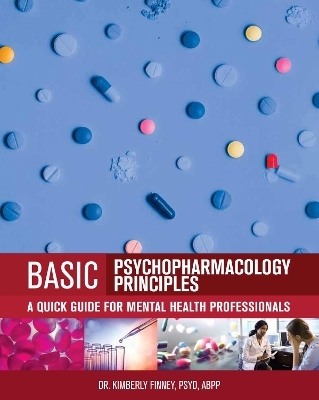
Basic Psychopharmacology Principles
A Quick Guide for Mental Health Professionals
Seiten
2018
Cognella, Inc (Verlag)
978-1-5165-1664-3 (ISBN)
Cognella, Inc (Verlag)
978-1-5165-1664-3 (ISBN)
Introduces students to basic concepts of psychopharmacology to help them develop a broad understanding of drugs and how they work. Students learn the risks and benefits of psychotropic medications, how to identify side effects, basic lab testing procedures, and how to apply pharmacological concepts to patient education and advocacy.
Basic Psychopharmacology Principles: A Quick Guide for Mental Health Professionals introduces students to basic concepts of psychopharmacology to help them develop a broad understanding of drugs and how they work in the body. Students learn the risks and benefits of psychotropic medications, how to identify side effects and adverse reactions, basic lab testing procedures, and how to apply pharmacological concepts to patient education and advocacy.
Part I of the guide familiarizes students with basic principles of pharmacology including drug types, the structure and function of the central nervous system, fundamental pharmacological concepts, and an overview of adrenergic and cholinergic neuronal systems. Part II discusses patient diagnosis and treatment, as well as biological markers and diagnostic testing. Part III dives deeper into clinical psychopharmacology, addressing how psychotropic medications interact with depression, psychosis, anxiety, trauma, pregnancy, and more. The guide concludes with a section on clinical considerations in which students are encouraged to apply biopsychosocial assessments and analyze clinical cases using the biopsychopharmacological model.
Written for future clinicians who will not prescribe medication but would benefit from a working knowledge of psychopharmacological interventions, Basic Psychopharmacology Principles is ideal for courses in social work, psychology, counseling, and marriage and family therapy.
Basic Psychopharmacology Principles: A Quick Guide for Mental Health Professionals introduces students to basic concepts of psychopharmacology to help them develop a broad understanding of drugs and how they work in the body. Students learn the risks and benefits of psychotropic medications, how to identify side effects and adverse reactions, basic lab testing procedures, and how to apply pharmacological concepts to patient education and advocacy.
Part I of the guide familiarizes students with basic principles of pharmacology including drug types, the structure and function of the central nervous system, fundamental pharmacological concepts, and an overview of adrenergic and cholinergic neuronal systems. Part II discusses patient diagnosis and treatment, as well as biological markers and diagnostic testing. Part III dives deeper into clinical psychopharmacology, addressing how psychotropic medications interact with depression, psychosis, anxiety, trauma, pregnancy, and more. The guide concludes with a section on clinical considerations in which students are encouraged to apply biopsychosocial assessments and analyze clinical cases using the biopsychopharmacological model.
Written for future clinicians who will not prescribe medication but would benefit from a working knowledge of psychopharmacological interventions, Basic Psychopharmacology Principles is ideal for courses in social work, psychology, counseling, and marriage and family therapy.
Kimberly Finney is a board certified clinical psychologist and a clinical associate professor in the Suzanne Dworak-Peck School of Social Work at the University of Southern California. She is also a retired United States Air Force officer, who served as the director of Mental Health Services, a flight commander, and an Air Force Space Command mental health consultant. Dr. Finney was one of four Air Force psychologists—and one of approximately 150 psychologists nationwide—credentialed to prescribe medications for the treatment of psychological disorders. She holds a Psy.D. in clinical psychology from Wright State University and a post-doctoral master of science in psychopharmacology from Nova Southeastern University.
| Erscheinungsdatum | 30.03.2018 |
|---|---|
| Verlagsort | San Diego |
| Sprache | englisch |
| Maße | 203 x 254 mm |
| Gewicht | 525 g |
| Themenwelt | Geisteswissenschaften ► Psychologie ► Klinische Psychologie |
| Medizin / Pharmazie ► Medizinische Fachgebiete ► Pharmakologie / Pharmakotherapie | |
| Medizin / Pharmazie ► Medizinische Fachgebiete ► Psychiatrie / Psychotherapie | |
| Medizin / Pharmazie ► Pharmazie | |
| ISBN-10 | 1-5165-1664-8 / 1516516648 |
| ISBN-13 | 978-1-5165-1664-3 / 9781516516643 |
| Zustand | Neuware |
| Informationen gemäß Produktsicherheitsverordnung (GPSR) | |
| Haben Sie eine Frage zum Produkt? |
Mehr entdecken
aus dem Bereich
aus dem Bereich
Information • Energie • Materie
Buch | Softcover (2015)
Lehmanns Media (Verlag)
CHF 41,90
ein Lehrbuch auf psychoanalytischer Grundlage
Buch | Hardcover (2024)
Kohlhammer (Verlag)
CHF 82,55


